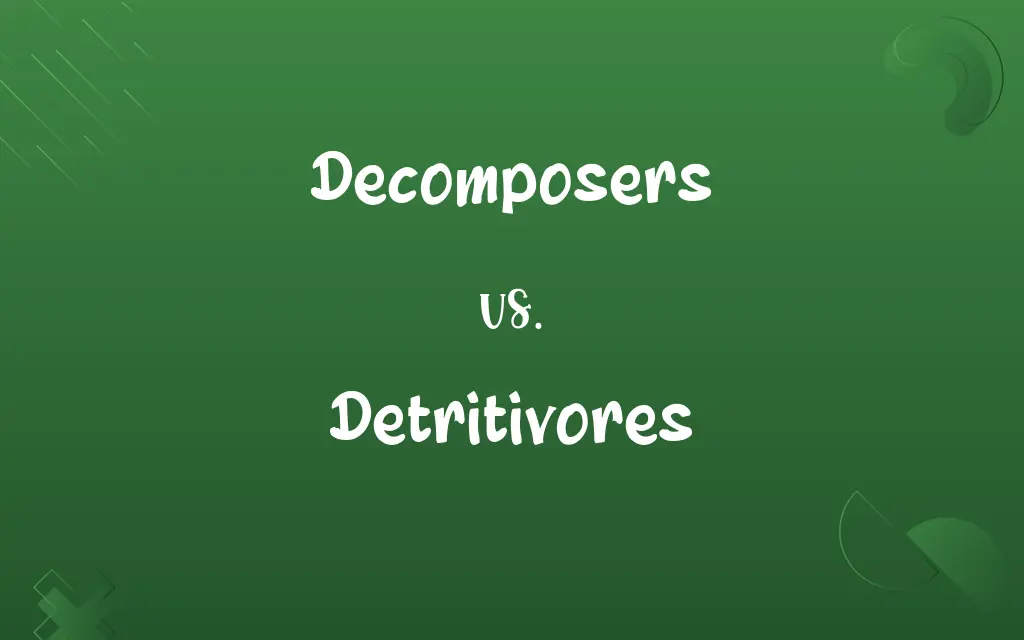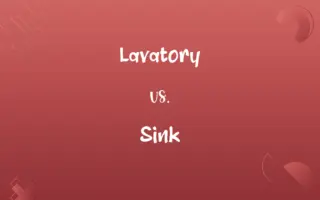Decomposers vs. Detritivores: Know the Difference

By Shumaila Saeed || Updated on December 25, 2023
Decomposers, like fungi and bacteria, chemically break down organic matter, while detritivores, such as worms and beetles, physically consume and digest detritus.

Key Differences
Decomposers, such as bacteria and fungi, play a crucial role in ecosystems by breaking down dead organic matter at a molecular level, releasing nutrients back into the soil. Detritivores, like earthworms and woodlice, physically break down detritus by consuming it, aiding in the decomposition process but not completing it chemically.
Shumaila Saeed
Dec 18, 2023
While decomposers work at a microscopic level, detritivores are often visible to the naked eye. Decomposers work by secreting enzymes to break down complex organic compounds, whereas detritivores ingest and then internally digest detritus.
Shumaila Saeed
Dec 18, 2023
Decomposers are essential for nutrient cycling, converting organic matter into forms usable by plants. In contrast, detritivores primarily contribute to breaking down larger pieces of organic matter into smaller ones, which are more easily processed by decomposers.
Shumaila Saeed
Dec 18, 2023
The activity of decomposers results in the final breakdown of organic materials, leading to the formation of simpler substances like carbon dioxide and water. Detritivores, however, primarily contribute to the physical fragmentation of dead organisms and waste products.
Shumaila Saeed
Dec 18, 2023
In ecosystems, decomposers are the final step in the decomposition process, ensuring the release of essential nutrients. Detritivores serve as an intermediate step, preparing organic matter for the final breakdown by decomposers.
Shumaila Saeed
Dec 18, 2023
ADVERTISEMENT
Comparison Chart
Type of Organism
Microscopic, like fungi and bacteria
Visible, like worms and beetles
Shumaila Saeed
Dec 18, 2023
Method of Decomposition
Chemical breakdown using enzymes
Physical consumption and internal digestion
Shumaila Saeed
Dec 18, 2023
Role in Ecosystem
Complete breakdown, nutrient cycling
Fragmentation of detritus
Shumaila Saeed
Dec 18, 2023
End Products
Simple substances like CO2 and water
Smaller physical pieces of organic matter
Shumaila Saeed
Dec 18, 2023
Dependency on Organic Matter
Directly break down complex compounds
Depend on larger pieces of organic matter
Shumaila Saeed
Dec 18, 2023
ADVERTISEMENT
Decomposers and Detritivores Definitions
Decomposers
Microbial life forms essential for nutrient recycling in ecosystems.
Bacteria in the soil serve as decomposers, converting dead plants into usable nutrients.
Shumaila Saeed
Dec 03, 2023
Detritivores
Key participants in breaking down organic matter in ecosystems.
Some crustaceans are detritivores, contributing to the breakdown of underwater detritus.
Shumaila Saeed
Dec 03, 2023
Decomposers
Natural recyclers converting dead material into simpler substances.
Earth's decomposers transform dead animals into basic elements for plant growth.
Shumaila Saeed
Dec 03, 2023
Detritivores
Species that ingest decomposing organic materials.
Certain beetles are detritivores, feeding on decaying wood and leaves.
Shumaila Saeed
Dec 03, 2023
Decomposers
Microorganisms responsible for the breakdown of organic waste.
Soil decomposers play a key role in maintaining the garden's health.
Shumaila Saeed
Dec 03, 2023
ADVERTISEMENT
Detritivores
Organisms that feed on dead organic matter, aiding decomposition.
Earthworms, as detritivores, help break down leaf litter in the soil.
Shumaila Saeed
Dec 03, 2023
Decomposers
Organisms that chemically break down dead or decaying organic matter.
Fungi act as decomposers in a forest, breaking down fallen leaves.
Shumaila Saeed
Dec 03, 2023
Detritivores
Consumers of detritus, playing a role in nutrient cycling.
Woodlice are detritivores that process fallen wood in forest ecosystems.
Shumaila Saeed
Dec 03, 2023
Decomposers
Biological agents that decompose organic materials.
Mushroom colonies are efficient decomposers in woodland areas.
Shumaila Saeed
Dec 03, 2023
Detritivores
Creatures that consume dead plants and animals for sustenance.
Millipedes, as detritivores, aid in the decomposition of forest floor debris.
Shumaila Saeed
Dec 03, 2023
Decomposers
An organism, often a bacterium or fungus, that feeds on and breaks down dead plant or animal matter, thus making organic nutrients available to the ecosystem.
Shumaila Saeed
Dec 01, 2023
Repeatedly Asked Queries
What do decomposers do in the ecosystem?
Decomposers break down dead material into simpler substances, releasing nutrients back into the environment.
Shumaila Saeed
Dec 18, 2023
Where do decomposers primarily function?
Decomposers function in various environments, including soil, water, and extreme habitats.
Shumaila Saeed
Dec 18, 2023
What role do detritivores play in nutrient cycling?
Detritivores contribute to nutrient cycling by breaking down and recycling organic matter.
Shumaila Saeed
Dec 18, 2023
What are decomposers?
Decomposers are microorganisms that chemically break down dead or decaying organic matter.
Shumaila Saeed
Dec 18, 2023
How do decomposers contribute to soil health?
Decomposers convert dead organic matter into nutrients that enrich the soil.
Shumaila Saeed
Dec 18, 2023
What is the main difference between decomposers and detritivores?
Decomposers chemically break down matter at a molecular level, while detritivores physically consume and then excrete it.
Shumaila Saeed
Dec 18, 2023
How do detritivores assist in decomposition?
Detritivores ingest and then excrete organic matter, making it more accessible for decomposers.
Shumaila Saeed
Dec 18, 2023
Are detritivores visible in the ecosystem?
Yes, detritivores like earthworms and some insects are often visible in the ecosystem.
Shumaila Saeed
Dec 18, 2023
Do decomposers directly release nutrients into the soil?
Yes, decomposers release nutrients directly into the soil or water through their breakdown process.
Shumaila Saeed
Dec 18, 2023
Do detritivores consume living plants or animals?
No, detritivores specifically feed on dead or decaying organic matter.
Shumaila Saeed
Dec 18, 2023
Can decomposers be seen with the naked eye?
Most decomposers, like bacteria and fungi, are microscopic and not visible to the naked eye.
Shumaila Saeed
Dec 18, 2023
Can detritivores be found in water ecosystems?
Yes, some detritivores like certain crustaceans thrive in aquatic ecosystems.
Shumaila Saeed
Dec 18, 2023
Can decomposers survive in harsh conditions?
Yes, some decomposers can thrive in extreme environments, like hot springs or arctic tundra.
Shumaila Saeed
Dec 18, 2023
What types of organisms are commonly detritivores?
Common detritivores include earthworms, woodlice, certain insects, and some crustaceans.
Shumaila Saeed
Dec 18, 2023
What are detritivores?
Detritivores are organisms that feed on dead organic matter, aiding in its physical breakdown.
Shumaila Saeed
Dec 18, 2023
Are all decomposers microscopic?
Most decomposers like bacteria and fungi are microscopic, but some, like certain fungi, can be larger.
Shumaila Saeed
Dec 18, 2023
Are detritivores important for plant growth?
Yes, by processing organic matter, detritivores contribute to the availability of nutrients for plants.
Shumaila Saeed
Dec 18, 2023
How do detritivores affect soil structure?
By consuming and excreting organic matter, detritivores help aerate and enrich the soil.
Shumaila Saeed
Dec 18, 2023
Do detritivores help in controlling waste in nature?
Yes, by consuming dead organic matter, detritivores help in waste management in natural ecosystems.
Shumaila Saeed
Dec 18, 2023
Do decomposers only work on plant matter?
No, decomposers work on all types of organic matter, including plant and animal remains.
Shumaila Saeed
Dec 18, 2023
Share this page
Link for your blog / website
HTML
Link to share via messenger
About Author
Written by
Shumaila SaeedShumaila Saeed, an expert content creator with 6 years of experience, specializes in distilling complex topics into easily digestible comparisons, shining a light on the nuances that both inform and educate readers with clarity and accuracy.








































































